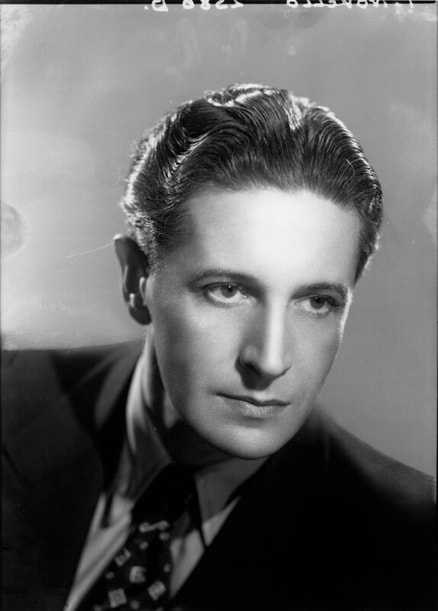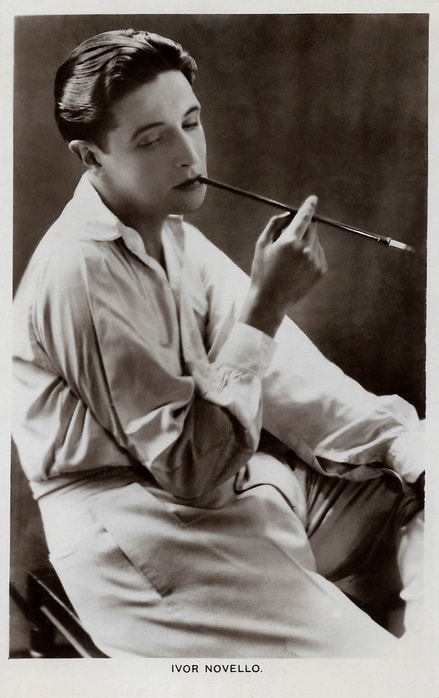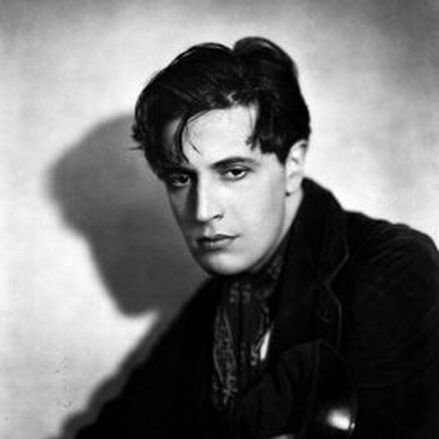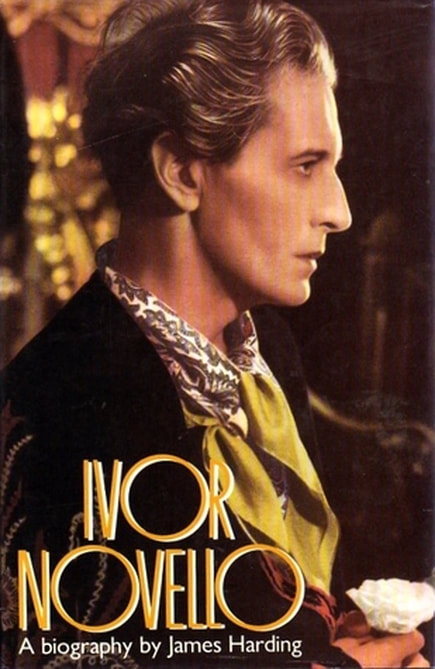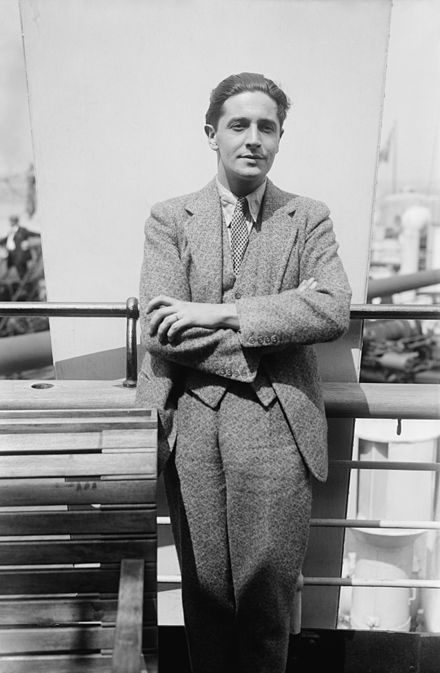|
Ivor Novello (born David Ivor Davies; 15 January 1893 – 6 March 1951) was a Welsh composer and actor who became one of the most popular British entertainers of the first half of the 20th century. He was born into a musical family, and his first successes were as a songwriter. His first big hit was "Keep the Home Fires Burning" (1914), which was enormously popular during the First World War. His 1917 show, Theodore & Co, was a wartime hit. After the war, Novello contributed numbers to several successful musical comedies and was eventually commissioned to write the scores of complete shows. He wrote his musicals in the style of operetta and often composed his music to the libretti of Christopher Hassall. In the 1920s, he turned to acting, first in British films and then on stage, with considerable success in both. He starred in two silent films directed by Alfred Hitchcock, The Lodger and Downhill (both 1927). On stage, he played the title character in the first London production of Liliom (1926). Novello briefly went to Hollywood, but he soon returned to Britain, where he had more successes, especially on stage, appearing in his own lavish West End productions of musicals. The best known of these were Glamorous Night (1935) and The Dancing Years (1939). From the 1930s, he often performed with Zena Dare, writing parts for her in his works. He continued to write for film, but he had his biggest late successes with stage musicals: Perchance to Dream (1945), King's Rhapsody (1949) and Gay's the Word (1951). The Ivor Novello Awards were named after him in 1955. BiographyNovello was born David Ivor Davies in Cardiff, Wales, to David Davies (c. 1852–1931), a rent collector for the city council, and his wife, Clara Novello Davies, an internationally known singing teacher and choral conductor. As a boy, Novello was a successful singer in the Welsh Eisteddfod. His mother set up as voice teacher in London, where he met leading performers of London. Novello was educated privately in Cardiff and then in Gloucester, where he studied harmony and counterpoint with Herbert Brewer, the cathedral organist. From there he won a scholarship to Magdalen College School in Oxford, where he was a solo treble in the college choir. He later said that this prolonged youthful exposure to early sacred choral music had turned his tastes, in reaction, to lush romantic music. From his early youth Novello showed a facility for writing songs, and when he was only 15, one of his songs was published. After leaving school, he gave piano lessons in Cardiff, and then moved to London in 1913 with his mother. They took a flat above the Strand Theatre, which became his London home for the rest of his life. In London he found a mentor in Sir Edward Marsh, a well-known patron of the arts and Churchill's secretary who encouraged him to compose and introduced him to people who could help his career. He adopted his mother's middle name, "Novello", as his professional surname, although he did not change it legally until 1927. In 1914, at the start of the First World War, Novello wrote "Keep the Home Fires Burning", a song that expressed the feelings of innumerable families sundered by World War I. Novello composed the music for the song to a lyric by the American Lena Guilbert Ford, and it became a huge popular success, bringing Novello money and fame at the age of 21. He avoided enlistment until June 1916, when he reported to a Royal Naval Air Service (RNAS) training depot as a probationary flight sub-lieutenant. After Novello twice crashed aeroplanes, Marsh arranged his move to the Admiralty office in central London for the rest of the war. Novello continued to write songs while serving in the RNAS. He had his first stage success with Theodore & Co in 1916. In 1917 Marsh introduced him to the actor Bobbie Andrews, who became Novello's life partner. Andrews introduced Novello to the young Noël Coward. Coward, six years Novello's junior, was deeply envious of Novello's effortless glamour. He wrote, "I just felt suddenly conscious of the long way I had to go before I could break into the magic atmosphere in which he moved and breathed with such nonchalance". In 1918 and after the war, Novello continued to write successfully for musical comedy and revue. The former included Who's Hooper? (1919), and The Golden Moth by Thompson and P. G. Wodehouse (1921), for which Novello provided the entire score. At the same time as his successes as a composer, Novello was making a career as an actor. With "a classic profile that gained him matinee idol status amongst the film-going public", he was sought out, on the strength of a publicity photograph, by the Swiss film director Louis Mercanton. Mercanton offered him a silent-film role as the romantic lead in The Call of the Blood (1920) and then in Miarka. Novello made his first British film, Carnival, the following year. Novello made his stage debut in 1921 in Deburau by Sacha Guitry, and, among other stage engagements in the next years, he played Bingley in a charity adaptation of Pride and Prejudice. At about this time, Novello had a short-lived affair with the writer Siegfried Sassoon. In 1923, Novello made his American movie debut in D. W. Griffith's The White Rose. He next co-wrote, produced and starred in the successful 1924 play The Rat. The play was made into a film in 1925, which was so successful that two sequels followed in 1926 and 1928. Other films in which Novello starred included Alfred Hitchcock's The Lodger, where he played the title character, and Downhill (both in 1927). During the late 1920s, Novello was the most popular male British film star and was often dubbed as Britain's "handsomest screen actor". The British film company Gainsborough Pictures offered Novello a lucrative contract, which enabled him to buy a country house in Littlewick Green, near Maidenhead. He renamed the property Redroofs, and he entertained there famously and with little regard for convention. Cecil Beaton, noting the frequent homosexual excesses, coined the phrase, "the Ivor – Noel naughty set". Noel Coward had by now caught Novello up professionally. In 1928 Novello starred in the silent adaptation of Coward's much more successful The Vortex, and made his last silent film, A South Sea Bubble. Novello returned to composing for the lyric stage in 1929, writing eight numbers for the revue The House that Jack Built. His successful Broadway production The Truth Game brought him to the attention of Hollywood studios. He accepted a contract to write for and appear in MGM films. He found little to do in Hollywood, however, and returned to London. After beginning the 1930s with a series of non-musical plays, Novello returned to composition in 1935 with Glamorous Night, which was the first of a series of enormously popular musicals. The Times considered that it was for these that Novello would be popularly remembered. The last of Novello's prewar musicals was The Dancing Years, which closed on the outbreak of the Second World War, and reopened at the Adelphi Theatre, running for a combined total of 696 performances, closing on 8 July 1944. This show was the closest Novello came to fulfilling his mother's early ambitions for him to write operas. Novello presented only two new shows during the Second World War. Arc de Triomphe (1943), was only a modest success, but Perchance to Dream (1945) was immensely successful, running for 1,022 performances. In between the two shows, Novello had been in serious legal trouble and served four weeks in prison for misuse of petrol coupons, a serious offence under rationing laws in wartime Britain. Novello's last full-scale production in this style was King's Rhapsody (1949). After the rigours of war, this escapist entertainment starring Novello and Zena Dare had strong box-office appeal, and ran for 841 performances. It was still running, at the Palace Theatre, when Novello's last show Gay's the Word (1951) opened. It was a departure from his established pattern, balancing the contrasting styles of European operetta and post-war American musicals. Novello died suddenly from a coronary thrombosis at the age of 58, a few hours after completing a performance of King's Rhapsody. He was cremated at the Golders Green Crematorium, and his ashes are buried beneath a lilac bush and marked with a plaque that reads "Ivor Novello 6th March 1951 'Till you are home once more'." He left an estate worth £160,000 (£5 million in 2019).
Only a few weeks before Novello's death, Noel Coward had written of him: "Theatre – good, bad and indifferent – is the love of his life. For him, other human endeavours are mere shadows. ... The reward of his work lies in the indisputable fact that whenever and wherever he appears the vast majority of the British public flock to see him." The Grove Dictionary of Music and Musicians writes of Novello that he was "until the advent of Andrew Lloyd Webber, the 20th-century's most consistently successful composer of British musicals". The Ivor Novello Awards for songwriting, established in 1955 in Novello's memory, are awarded each year by the The Ivors Academy to British songwriters and composers as well as to an outstanding international music writer. Ivor Novello was portrayed in Robert Altman's 2001 film Gosford Park by Jeremy Northam, and several of his songs were used for the film's soundtrack. In 2005, the Strand Theatre, above which Novello lived for many years, was renamed the Novello Theatre, with a plaque in his honour set at the entrance.
0 Comments
Leave a Reply. |
Categories
All
Archives
December 2023
|
